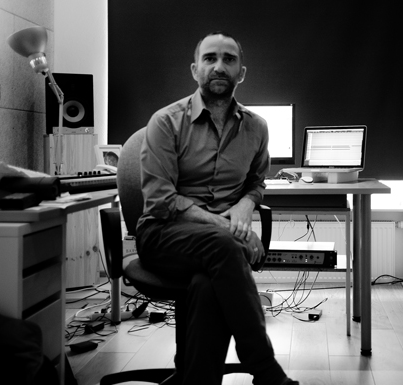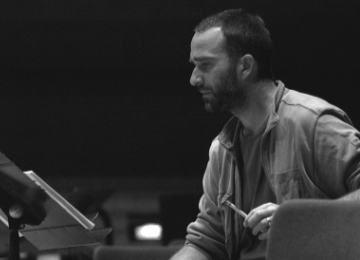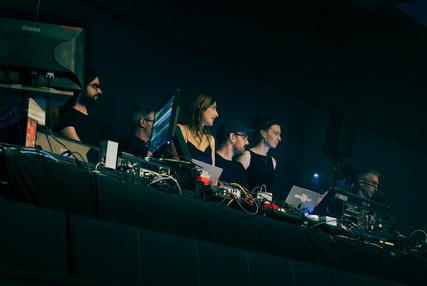3 questions à Pierre Jodlowski
Pierre Jodlowski, présentez-nous votre parcours.
 En somme, j’ai, au départ un parcours classique m’étant formé très jeune dans les conservatoires puis à l’université de Toulouse et au CNSM de Lyon. Simplement, j’ai toujours été intéressé par une pratique musicale vaste (improvisation, jazz, rock) et très vite, j’ai senti un profond décalage entre ce que j’imaginais d’un espace de création totalement libre et la réalité des concerts de musique contemporaine (très conditionnée encore à l’héritage classique dans leurs modes de représentation). Je crois que c’est sur la base de ce décalage que j’ai construit mon parcours en m’intéressant très tôt au domaine des images, à la question du geste, des lumières, d’une approche théâtrale du phénomène sonore… Au départ, dans une approche très expérimentale et avec des technologies balbutiantes (faire du temps réel ou de la vidéo à la fin des années 1990 n’était pas vraiment aussi accessible qu’aujourd’hui) – puis, peu à peu, en construisant un langage qui intègre des principes narratifs, un engagement sociétal, une réflexion sur la question de nouveaux rituels… Mon catalogue, qui peut sembler très éclectique, converge en réalité vers une idée simple et très ancienne : retrouver une cohérence entre le mode de représentation et le contenu créatif. Une « praxis » musico-sonore où le geste et la question de l’énergie est au centre pour diriger les relations avec les autres flux scéniques. J’ai toujours composé avec des images mentales qui précèdent la mise en œuvre d’un projet : aujourd’hui, les outils technologiques nous permettent de donner corps à ces images et construire un propos où, par la musique, elles s’articulent en de nouveaux objets artistiques.
En somme, j’ai, au départ un parcours classique m’étant formé très jeune dans les conservatoires puis à l’université de Toulouse et au CNSM de Lyon. Simplement, j’ai toujours été intéressé par une pratique musicale vaste (improvisation, jazz, rock) et très vite, j’ai senti un profond décalage entre ce que j’imaginais d’un espace de création totalement libre et la réalité des concerts de musique contemporaine (très conditionnée encore à l’héritage classique dans leurs modes de représentation). Je crois que c’est sur la base de ce décalage que j’ai construit mon parcours en m’intéressant très tôt au domaine des images, à la question du geste, des lumières, d’une approche théâtrale du phénomène sonore… Au départ, dans une approche très expérimentale et avec des technologies balbutiantes (faire du temps réel ou de la vidéo à la fin des années 1990 n’était pas vraiment aussi accessible qu’aujourd’hui) – puis, peu à peu, en construisant un langage qui intègre des principes narratifs, un engagement sociétal, une réflexion sur la question de nouveaux rituels… Mon catalogue, qui peut sembler très éclectique, converge en réalité vers une idée simple et très ancienne : retrouver une cohérence entre le mode de représentation et le contenu créatif. Une « praxis » musico-sonore où le geste et la question de l’énergie est au centre pour diriger les relations avec les autres flux scéniques. J’ai toujours composé avec des images mentales qui précèdent la mise en œuvre d’un projet : aujourd’hui, les outils technologiques nous permettent de donner corps à ces images et construire un propos où, par la musique, elles s’articulent en de nouveaux objets artistiques.
Je veux également évoquer mon activité de directeur artistique, à la fois de la Compagnie éole à Toulouse et de festivals interdisciplinaires en Europe. Cette pratique est indissociable de mon approche artistique et me permet de me confronter très précisément aux questions de production. Questions qui sont souvent absentes des cursus d’enseignements et peuvent constituer un frein majeur au développement d’une carrière artistique.
Vous vous dirigez aujourd’hui vers l’enseignement. Quelle motivation vous a conduit à faire ce choix ?
Même si je n’ai jamais enseigné dans le cadre d’un poste régulier, j’ai toujours participé à des master class ou animé des workshops gardant ainsi un lien fort avec la question de la transmission. Pour moi, transmettre ne consiste pas simplement à s’appuyer sur un échange de savoirs mais doit également intégrer une approche expérimentale. Car enseigner peut consister en un acte créatif très puissant. En ce sens, j’apprécie particulièrement le modèle des workshops où l’on peut, sur un temps donné, se fixer des objectifs concrets et chercher ensemble.
 Du reste, j’ai développé mes projets autour d’enjeux interdisciplinaires depuis plus de vingt ans ; et j’ai acquis une certaine maîtrise des outils liés à ces pratiques mais également, et ce point m’interpelle beaucoup, de nouveaux paradigmes méthodologiques. En effet, la pratique de la composition n’est pas du tout la même dès lors qu’on envisage la scène ou les espaces de représentation dans leur ensemble. Il y a là un challenge très excitant pour moi dans le cadre des nouveaux enjeux du cursus. Enfin, dans une société très individualisée, il me semble très important de remettre du sens collectif dans les pratiques des compositeurs ; finalement, nous produisons sans cesse des collectifs dès lors qu’on écrit pour un groupe instrumental, que l’on intègre des acteurs ou de la danse… et je trouve nécessaire aujourd’hui de remettre en question la figure solitaire du compositeur et renouer avec le partage et l’apprentissage mutuel dans l’élaboration des projets.
Du reste, j’ai développé mes projets autour d’enjeux interdisciplinaires depuis plus de vingt ans ; et j’ai acquis une certaine maîtrise des outils liés à ces pratiques mais également, et ce point m’interpelle beaucoup, de nouveaux paradigmes méthodologiques. En effet, la pratique de la composition n’est pas du tout la même dès lors qu’on envisage la scène ou les espaces de représentation dans leur ensemble. Il y a là un challenge très excitant pour moi dans le cadre des nouveaux enjeux du cursus. Enfin, dans une société très individualisée, il me semble très important de remettre du sens collectif dans les pratiques des compositeurs ; finalement, nous produisons sans cesse des collectifs dès lors qu’on écrit pour un groupe instrumental, que l’on intègre des acteurs ou de la danse… et je trouve nécessaire aujourd’hui de remettre en question la figure solitaire du compositeur et renouer avec le partage et l’apprentissage mutuel dans l’élaboration des projets.
Quel regard portez-vous sur la jeune création ? Comment envisagez-vous de lui faire partager votre expérience ?
Les jeunes artistes sont aujourd’hui de plus en plus décomplexés vis à vis des cadres imposés par l’institution musicale. Ils se sont affranchis de nombreux codes, intègrent tout type de matériaux et, bien sûr, sont baignés dans les technologies et les manipulent souvent avec beaucoup d’aisance, voire une sorte de naturel. J’ai la chance de travailler au cœur de l’Europe et j’assiste, en Pologne, en Allemagne, dans les pays du Nord à l’émergence d’une nouvelle génération d’artistes qui développent des projets débridés, intègrent les technologies de manière déconcertantes et ne s’embarrassent plus d’une sorte de cadre bien-pensant de ce qu’on appelait les « arts savants ». Cependant, dans cette approche très débridée continuent de se poser des questions fondamentales liées à la pratique musicale, en particulier l’écriture du temps et de l’espace. Beaucoup de ces projets s’affirment comme « œuvre concept » mais peuvent manquer parfois d’une profondeur temporelle, de trajectoires qui dilatent ou compressent les champs perceptifs. Et c’est probablement à cet endroit que je pourrai apporter mon regard et mes connaissances dans le cadre du cursus. Identifier ce qui, dans un concept, peut générer un développement, une emprise solide du plateau, l’avènement d’un langage spécifique, d’un assemblage de signes et de sons qui tissent un cheminement dramaturgique. Si la musique s’empare aujourd’hui de tous ces nouveaux codes, de tous ces nouveaux outils, elle n’en reste pas moins inscrite dans l’espace éphémère de la scène où se jouent, en un temps donné, l’éclosion d’une forme qui peut faire sens de multiples manières.



